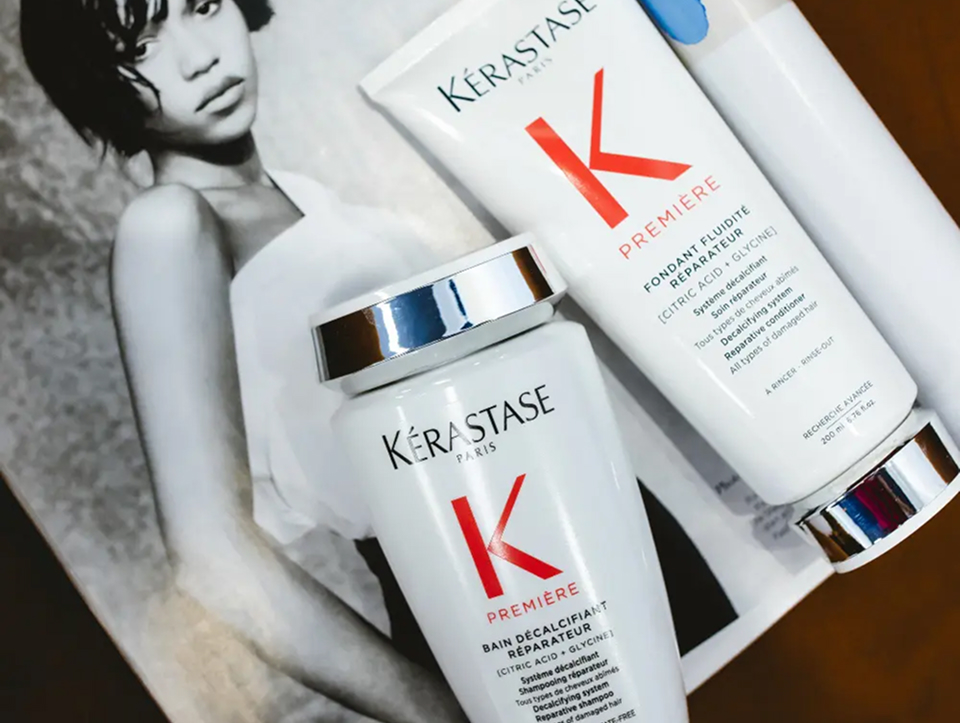You’ve probably heard that stress affects your mind and mood, but did you know that stress and scalp health are also deeply connected?
When you’re under pressure, your scalp may respond with itchiness, tightness, flaking, or even unexpected hair shedding.
You deserve a scalp that feels calm and balanced, not tense and irritated. At Haste Hair, we’ve helped clients restore comfort by combining gentle routines, targeted care, and professional support.
How Stress Disrupts Scalp Health
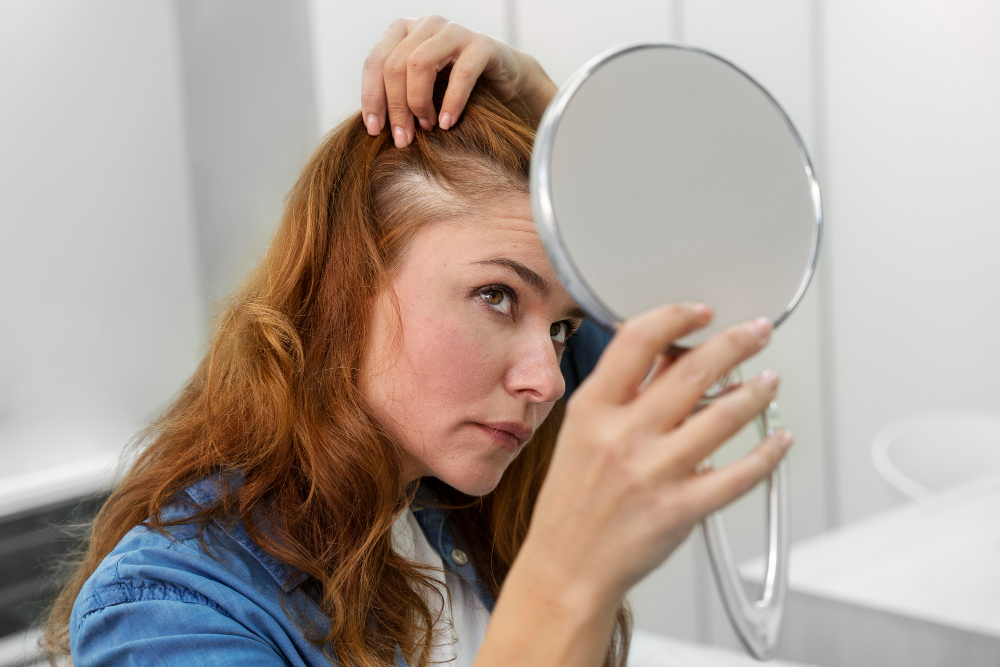
Stress triggers a hormonal cascade (cortisol, adrenaline) that directly disrupts scalp homeostasis. When these hormones spike, your scalp’s balance can be tipped in three main ways:
- Sebum production shifts — stress can drive glands to overproduce (oily scalp) or underproduce (dry scalp).
- Inflammation increases, weakening the scalp’s protective barrier and making it more susceptible to irritation.
- Hair cycles change — significant stress can prompt hair follicles to enter a resting (telogen) phase, resulting in shedding weeks later.
🔬 Scientific research suggests that oxidative stress and scalp inflammation can compromise the scalp environment, ultimately affecting hair growth and quality. Research also indicates that stress disrupts the scalp microbiome, contributing to the development of dandruff and acne.
Stress and Scalp Health: Common Symptoms When Stress Harms the Scalp
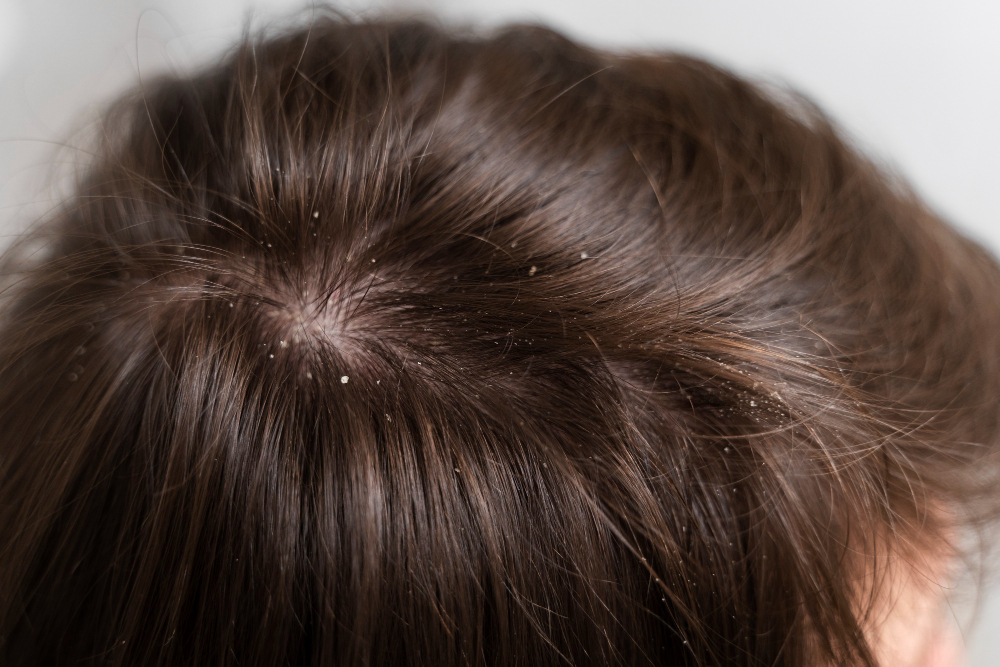
Wondering if your scalp is stressed out? Here are the tell-tale signs to watch for — and what they mean for your stress and scalp health:
Tightness or tension — It can feel like you’re wearing a headband that won’t budge. This comes from micro-muscle contractions across the scalp and blood vessel constriction triggered by stress hormones.
Itching or burning sensations — Even before flakes show up, stress-driven inflammation can heighten nerve sensitivity, making your scalp feel hot, itchy, or irritated.
Flaking or dandruff — Stress throws off your skin’s balance, leading to either dry, powdery flakes or oily, sticky patches. Many people experience flare-ups of dandruff or seborrheic dermatitis during periods of stress.
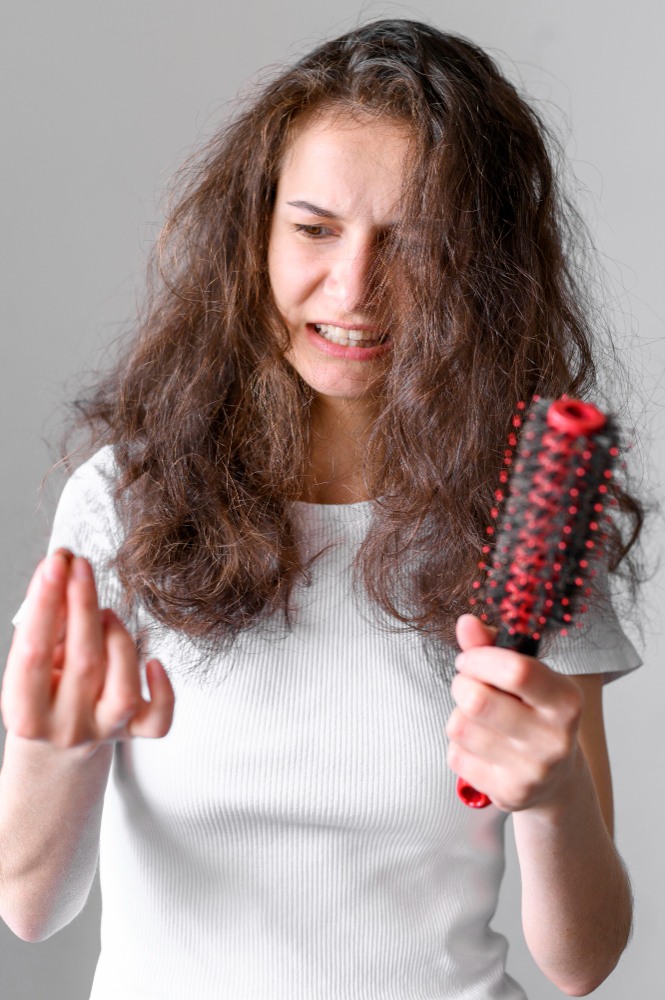
Hair shedding — Stress-related shedding (telogen effluvium) doesn’t happen overnight. Hair often begins to fall out more than usual about 6 to 12 weeks after a stressful life event. It can feel alarming, but the process is usually temporary once stress is managed.
Small bumps or “scalp acne” — Stress can alter sebum production and weaken your scalp’s barrier, creating the perfect environment for clogged follicles, redness, and small pimple-like bumps.
When to seek help — If you notice open sores, severe or burning pain, rapid patchy hair loss, or symptoms that keep worsening despite home care, consult a dermatologist right away. These could signal a condition that needs medical treatment.
🌿 Learn more about hair care goals for 2026
Stress & the Scalp: Why Some People React Differently
Not everyone experiences stress and scalp health issues the same way. Factors like genetics, natural oil levels, and your scalp microbiome all influence the outcome.
- Dry-prone scalps may feel tight, itchy, and flaky under stress.
- Oil-prone scalps may produce more sebum when cortisol surges.
- In extreme cases, stress can trigger telogen effluvium (TE), a temporary form of hair loss (Harvard Stem Cell Institute).
Scalp Conditions Linked to Stress
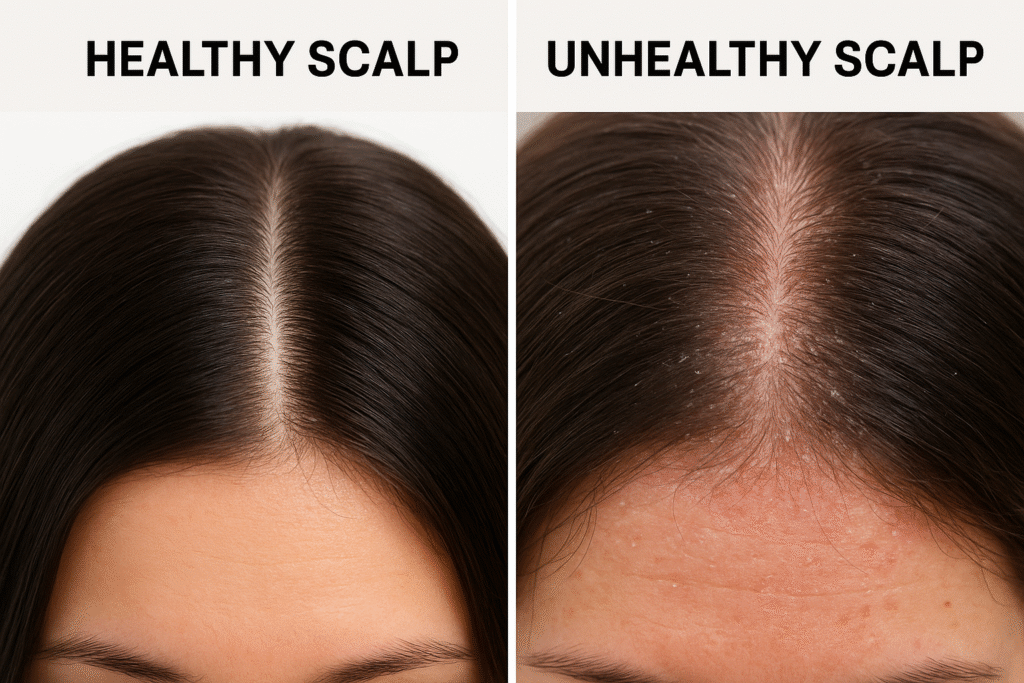
Stress doesn’t just feel uncomfortable; it can trigger or worsen real scalp conditions. Here are the most common ones tied to poor stress and scalp health:
Telogen Effluvium (TE) — This is one of the clearest links between stress and scalp changes. When your body is under emotional or physical pressure, it can push more hair follicles into the “resting” phase. Weeks later, you may see noticeable hair shedding all at once. The good news? TE is usually temporary if stress is managed and your scalp receives proper care.
Seborrheic Dermatitis & Dandruff — Stress can disrupt your scalp’s natural oil balance and weaken its barrier, allowing yeast overgrowth that worsens flakes and irritation. That’s why many people notice dandruff flares right before a big life event or during busy, stressful seasons.
Scalp Dysesthesia — A less well-known but very real condition, this involves burning, tingling, or tightness in the scalp without visible signs. Researchers believe stress and heightened nerve sensitivity are key triggers. It can feel uncomfortable even when your scalp looks “normal.”
Scalp Acne / Folliculitis — When stress hormones alter sebum production, excess oil and inflammation can clog follicles. This often appears as small bumps, redness, or even painful pimples on the scalp.
👉 Want to dive deeper? Explore these guides: Common Scalp Conditions | Healthy vs Unhealthy Scalp | Sensitive Scalp.
Quick Relief Tips for a Stressed Scalp

You can calm stress and scalp health issues with these soothing steps:
- Daily scalp massage (1–3 mins): Boosts circulation + eases tension.
- Gentle cleansing: Use a mild, fragrance-free shampoo and avoid over-washing.
- Cool compresses: Calm hot, itchy, or inflamed areas.
- Breathing breaks: Short meditation or deep breathing can help lower cortisol levels.
- Calming serums: Look for ingredients such as niacinamide, panthenol, or aloe vera.
👉 Some studies suggest scalp massage may reduce stress hormones and even improve hair density.
Building a Better Routine for Stress & Scalp Health

Consistency is key when caring for both your mind and your scalp. Stress takes time to show its impact on hair, so a steady routine helps break the cycle. Here’s a simple 4-week roadmap:
Week 1: Gentle Reset
Swap out harsh shampoos or styling products that strip natural oils. Instead, use a mild, scalp-friendly cleanser to maintain balance without over-drying.
👉 Tip: Learn more about proper care here: How Do You Exfoliate Your Scalp?
Week 2: Deep Nourishment
Introduce a soothing scalp mask, lightweight oil, or leave-in treatment to calm irritation and replenish moisture. This helps strengthen the scalp barrier against stress-driven flare-ups.
👉 Tip: See how diet plays a role: How Your Diet Affects Scalp Health
Week 3: Stress Relief Habits
Your scalp reflects what’s happening inside your body. Prioritize better sleep, hydration, mindfulness, and light exercise — all proven to reduce stress hormones that affect scalp health.
👉 Tip: Want to understand the cycle? Check out: Hair Growth Cycle Explained and the difference between Hair Growth and Hair Retention
Week 4+: Reassess & Seek Support
If you’re still noticing shedding, irritation, or flaking, don’t wait it out. Stress-related scalp issues may need professional treatment or targeted therapies. Early action = better long-term results.
👉 Additionally, read our article on the 7-Day Scalp Detox Routine
Professional Treatments & When to Seek Help
DIY is a great start, but sometimes stress and scalp health require expert care:
- If shedding is sudden or patchy → rule out female pattern hair loss or general hair loss.
- Salon treatments → barrier-repair masks, antioxidant therapies, or gentle LED therapy.
- Studies show antioxidant + barrier-support treatments improved thinning hair over 24 weeks.
👉 Tip: Learn more about how scalp treatments can help with hair loss.
Protecting Stress and Scalp Health
Stress doesn’t just affect your mind; it leaves a visible mark on your scalp. Simple, consistent habits, such as gentle cleansing, hydrating treatments, stress-reducing rituals, quality sleep, and seeking professional guidance, can help maintain a healthy scalp.
Treat your scalp with care and patience, and it will respond positively. Book your scalp treatment with us at Haste Urban Hair Spa today.
FAQ
Can stress cause dry scalp?
Yes. Stress-driven inflammation can weaken the scalp’s natural barrier, reducing its ability to retain moisture. This often results in dryness, flaking, and itchiness.
Can stress make my scalp oily?
Yes. Elevated cortisol levels during stress can overstimulate the sebaceous glands, leading to the production of excessive sebum. This may lead to greasy patches and contribute to scalp acne or clogged follicles.
Why does my scalp feel tight when I’m stressed?
Stress can increase muscle tension in the scalp and neck, while heightened nerve sensitivity and inflammation make the skin feel constricted. This manifests as that uncomfortable “tight band” sensation many people notice.
How long does hair recover after stress-related shedding?
Hair begins to regrow within 3–12 months after the stressor is resolved, although the timing varies from individual to individual. Maintaining good nutrition, scalp care, and reducing stress can support faster recovery.









